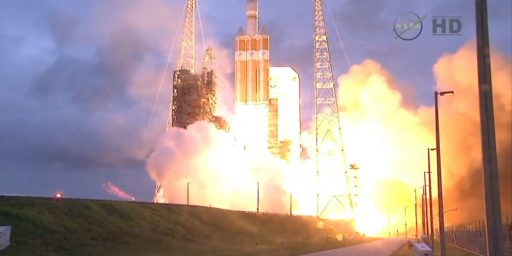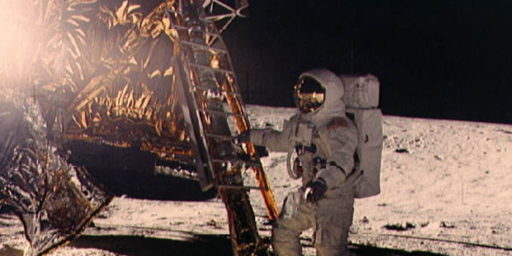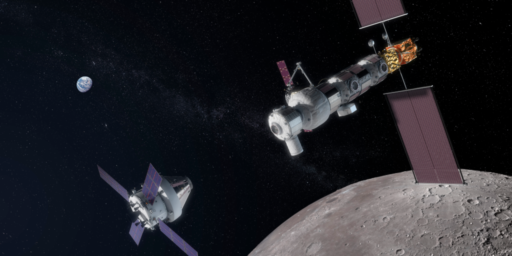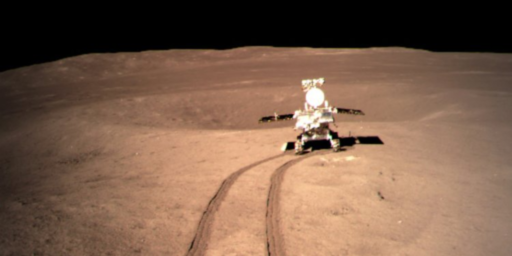TO BOLDLY GO. . .
The rather unfortunately named Homer Hickam subtitles his WSJ op-ed supporting the Mars trip “Space exploration is cool, and deficit moaners are nerds.” Heh.
The argument is rather amusing.
All I’ve got to say is please, for pity’s sake, stop worrying about NASA stealing money from your favorite federal program and adding to the deficit. Out of a $2 trillion-plus budget in 2004, human resources programs (Education, Health and Human Services, Housing and Urban Development, Labor, Social Security, etc.) will get an astounding 34%! In contrast, NASA has the smallest budget of all the major agencies in the federal government. In fact, its budget has represented less than 1% of the total budget each year since 1977 and it will probably never get more than a fraction above that, even with this new plan.
Since when is NASA a “major agency”? And 1% of two trillion dollars is, as they say in these parts, real money.
The crux of the argument, as always, is a combination of space as a modern-day Works Progress Administration or, Hey, the Apollo program gave us Tang!
Before they complain about it, I wish the moaners would take the time to find out a few things about NASA’s measly 1%. It has added billions of dollars back to our economy. It’s about the only program in the federal budget that has a track record of doing that. When NASA does cutting-edge work, new products are devised and people, Americans, are put to work producing them. To keep our economy steaming and pay our bills, we have to stay ahead in product innovation. That means inventing and manufacturing new products. One proven way to do that is to get the space program going with some real work.
Well, let’s see. It takes 1% of two trillion, or roughly $200 billion, out of the economy and puts “billions” back in. How many billions?
It seems to me that a more fruitful argument is this one:
Let’s be clear. Space is a nasty and cruel place for human beings. The analogy that going into space is like Columbus sailing off to discover the New World followed by hordes of immigrants is ludicrous. The moon isn’t the Bahamas and Mars isn’t New England. Antarctica is the better analogy. The world has been mucking around down there for over a century, but I don’t see too many towns sprouting up on the ice. Yet what’s happening there is productive. The scientists and engineers who have journeyed to that faraway place are there to try to figure out some things, such as how the Earth works.
How the Earth works is pretty important, especially if we want to keep living on it. And right there is the key to clear thinking about human beings in space. There are a lot of people, just like those men and women down at the South Pole, who need to go to the moon and maybe beyond to help figure out how the Earth and the universe works, to discover the answers to some fundamental questions of chemistry, physics, biology, medicine and, yes, even philosophy that might be answered there and only there. And here’s a prediction. Once we get people on the moon, more than a few of them will figure out how to turn a buck, lots of bucks. There’s no downside that I can see to the entire enterprise. I think even my dad would agree.
Well, there’s plenty of downside in opportunity costs and risk to the participants. The question is whether the scientific benefit outweighs those.





If nothing else, I wish N.A.S.A. would have some fun for once in it’s life and do something like announcing the space rover has discovered life on Mars and then flash a scene from, say, “Abbott and Costello Go To Mars”…….. This would be better spent money than what I saw on t.v. last week: Some official, who looked like he just lost his mother , stating, “The rover moved 11 inches.”
Wait–I should look this up but I thought NASA’s current budget is more like 20 billion per year, not 200 billion. Ok, according to the 2004 Budget proposal, in 2001 the actual amount spent was 14,253 million, 2003 is expected to come in at about 15 billion.
http://w3.access.gpo.gov/usbudget/fy2003/pdf/bud27.pdf
0.075% is less than 1% *grin*
Oops, we both did our arithmetic wrong. 1% of 2 trillion is 20 billion, not 200 billion. And 15 billion of 2 trillion is 0.75%.
I find it a little odd that he’s simply described as the author of October Sky. He was a major NASA engineer in the Apollo era–Rocket Boys (which was later retitled to the anagram October Sky) is an autobiography of his pre-college years.
NASA isn’t a major agency right now, but it is responsible for areas that have the long term potential to account for most of our GDP.
UGH!… Nothing like a bunch of pundits running around making comments when they don’t have the facts right.
1 trillion is a thousand billion so 1% is 10 billion since 10×100 is 1000. 1% of 2 trillion is 20 billion.
As far as taking money out of the economy and putting it back in, money doesn’t get stuffed into mattresses. It gets spent by the government in the economy. Reagan once said something like if the government spends a dollar that stimulates the economy but if I spend a dollar for some reason people say it doesn’t.
The real question is how does that money get returned. If it gets spent inefficiently, it’s a drag that causes the economy to slow down. That’s why growth in government slows down economies long-term.
Technological innovation is another way that the economy is helped. I can’t help but be dubious about this aspect. The reason is that technologically, getting to the moon the first time was a bigger step than going a second time would be or the ISS. Ten years prior we barely had rockets that could get off the ground! We didn’t have computers, communication systems, etc. These were all new. Seems to me that going to Mars doesn’t require anything fundamentally new. In fact, it’s more about getting the software right.
Something really innovative would be perfecting scramjet technology or building the space train or whatever it’s called that would allow us to truck equipment into geosynchronous orbit. That would require REAL innovation and certain has clear application.
Why was Homer Hickam listed only as an author? Because that’s the way he makes his living these days. He’s a great writer, by the way, and his books are mostly not about space. His Rocket Boys/October Sky was about growing up in Coalwood, West Virginia. His latest, The Keeper’s Son, is a novel about life in the Outer Banks during World War II. Hickam was NOT a major aerospace engineer during the Apollo era. He was in the Army in Vietnam during most of that time. He worked for NASA as a training manager for astronauts in the 1980’s and 90’s until he retired. You can look it up at http://www.homerhickam.com like I did.
—